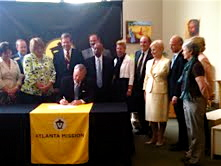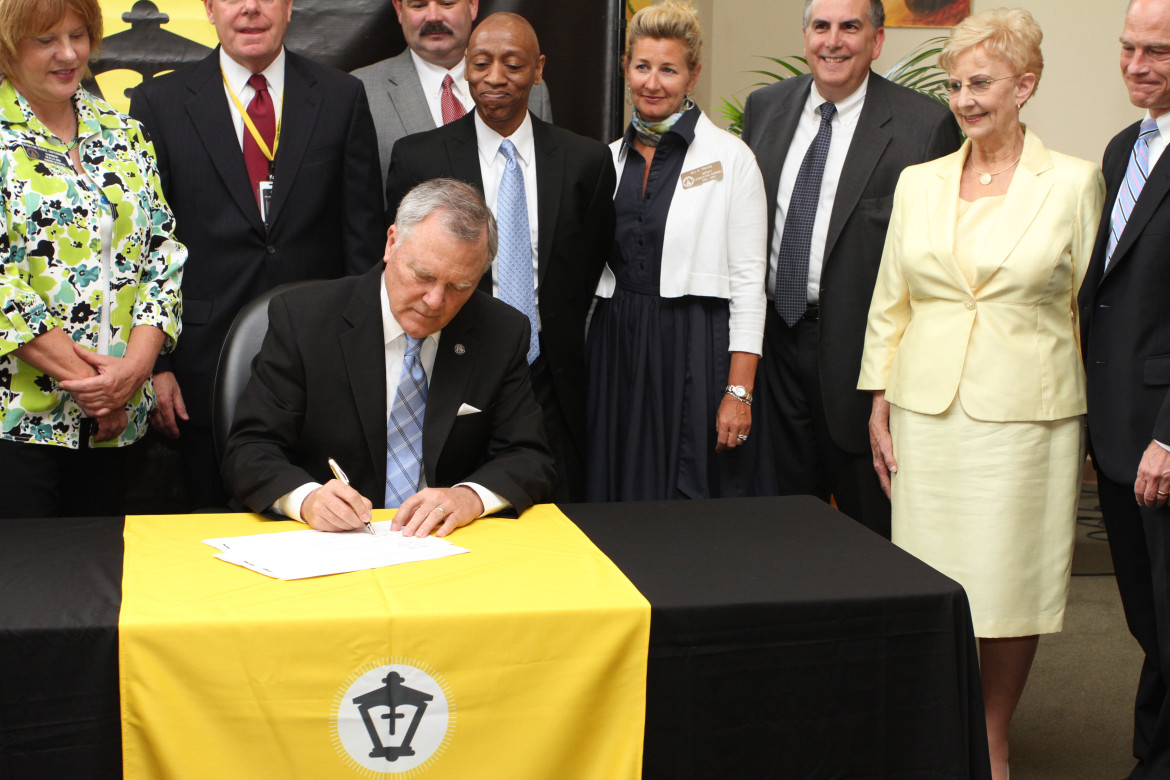
Courtesy Juvenile Justice Fund
The human trafficking bill that toughens the penalty for sex traffickers and seeks to improve outcomes for victims has been officially signed into Georgia law.
A small crowd of supporters gathered around Governor Nathan Deal Tuesday afternoon as he signed HB 200 at My Sister’s House in the Atlanta Mission. The legislation was introduced this year by Rep. Ed Lindsey (R-Atlanta) and passed within the same legislative session, which wrapped up last month.
The governor and his wife, First Lady Sandra Deal, shared encouraging words to the families of trafficking survivors during the signing event. Both commended child advocates for remaining vigilant in their work to eradicate child sex trafficking.
The bill’s signing is being touted as an especially critical victory because Atlanta is a known hub for human trafficking. Representatives from Street GRACE, a non-profit consortium of churches that provide volunteer support and advocacy initiatives for at-risk children statewide, say about 375 girls are exploited in Georgia each month, with the majority of the illegal incidents occurring in Atlanta. Within the same time frame, the organization estimates, about 7,200 men knowingly or unknowingly purchase sex from teen girls in the state.
Key provisions in HB 200 include:
- Provides an expanded definition of “coercion” in the human trafficking statute, to include causing or threatening financial harm.
- Prohibits defense by blood relation – such as parents exploiting their children – or by marriage – such as a husband “selling” his wife.
- Significantly beefs up penalties for human traffickers who target minors. If the victim is at least 16 but less than 18 years old, the crime is a felony and punishable by 5-20 years in prison and a fine of $2,500 to $10,000. If the victim is under 16 years old, the crime is a felony and punishable by 10-30 years in prison and a fine of up to $100,000.
- Treats those in sexual servitude as victims, not criminals, by offering them recovery under the state crime victim’s fund.
- Provides an affirmative defense for victims when coming forward to the sexual crimes of prostitution, sodomy, solicitation of sodomy and masturbation for hire, if the defendant was being trafficked for sexual servitude.
- Allows the state to seize any real or personal property that a trafficker used for, or bought with the proceeds of the crime.
- Requires law enforcement agencies to receive training on how to relate to human trafficking victims.
Rep. Lindsey’s bill built upon the foundation established by a failed measure introduced last year by Sen. Renee Unterman, who also supported HB 200. Sen. Unterman’s bill had pushed for children 16 and under to be treated as victims and not criminals in prostitution cases. Georgia Attorney General Sam Olens had members of his staff work with Rep. Lindsey in strengthening the legal framework for HB 200, in hopes of helping it avoid a similar fate.
On the heels of the legislative victory, supporters of the measure have told JJIE.org they will begin focusing their efforts on ensuring the law gets implemented and enforced.

This is fantastic! We need tougher laws and better enforcement on this human trafficking problem. Congratulations to those that passed this bill. You are a hero!
Humans are not for sale purpose…
Each year by some estimates, hundreds of thousands of girls and boys are trafficked globally. Human trafficking is a global issue.
Very few people are actually aware of how large the problem is. Even if people are aware, they generally turn a blind eye towards the entire situation. For this reason, the level of awareness needs to be increased drastically.
“Sold: An MTV EXIT Special”, a gripping documentary presented by Indian actress and UNFPA Ambassador, Lara Dutta. The Program introduces the tragedy of trafficking in South Asia where thousand of young girls and boys are sold into modern-day slavery and shows how each one of us can help to prevent modern-day slavery.
To watch this documentary online visit http://www.cultureunplugged.com/play/479